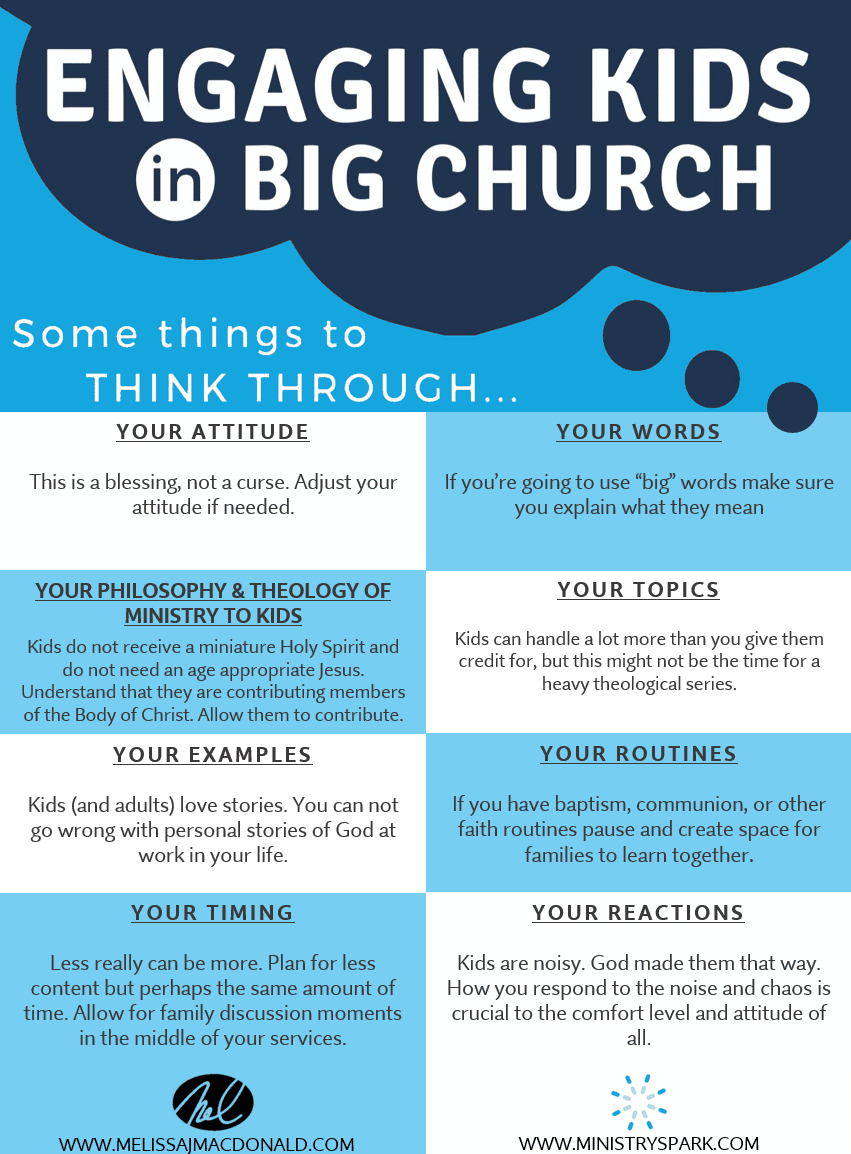In this season especially, you need to let families know they are welcome. Don’t say they’re welcome and then not change anything.
We are going to talk about engaging children in big church—a question, thought, and conversation that is a big deal. One of the things we often find is that people think that engaging kids in big church means keeping them quiet. And, as we all know, that’s actually not engagement.
When I was 24, I was living in the Pacific Northwest and driving along the Columbia River Gorge. God began to speak to my heart and said, Mel, I want you to start coming alongside other leaders. And I was like, Lord, I am 24. I’m the young whipper snapper. I got nothing.
And He called me to it although He didn’t bring it to fruition right there. Side note: God often calls us to something but doesn’t bring it to fruition right away.
And so, He called me to it. My heart, from that point on, was how do I come alongside those in the trenches and lead, love, and serve them.
As we think about engaging children in big church, it’s important to recognize that it is a complicated subject. So, we’re going to delicately go through it.
First, I know the fear that comes with identity. As a children’s pastor my identity is that I serve kids. And in this time where we aren’t necessarily having kids’ church, we’re almost not sure who to be anymore because we don’t really know what our jobs look like. But having kids in big church is actually the biggest opportunity that we have ever had to minister to kids and families.
Understand the Beginning

What if, instead of thinking of this as a disappointment, we view this as the biggest opportunity we’ve ever had?
I say that for a few reasons. I’ve been talking about the idea of kids in big church for years.
Historically speaking, whenever Sunday school started, it started with street kids who were working in factories six days a week. And then, on the seventh day, Sunday, some really great Christ followers decide to help get these kids out of the streets. They believed they needed to go to school. So, they started teaching them on Sundays. They also added in morality and Bible because that was their heart. What has happened is this idea has morphed through the years to what we now call Sunday school.
In the church, we’ve kind of tweaked it to the point where we began to say, okay, parents, you bring your kids to us on a Sunday and we will take care of their spiritual welfare.
Well, that’s actually not our job and that can be really hard to hear. For some of you, that’s actually in your job description now. But as ministry leaders, our job is not to be the number one influencer in a child’s spiritual life. Biblically speaking, that is not our job.
So historically speaking, this is where Sunday school started. But biblically speaking, our job is to come alongside parents because parents are the number one spiritual influencer in kids’ lives—good or bad.
I’ve spent a lot of time mourning over the bad. And then God reminds me that He actually is still God no matter the circumstances.
Trust God to Be God
Don’t ever discount God in the midst of hard circumstances.
I’ll tell you a little about my dad.
My dad is a pastor. He’s been a pastor for 40 plus years. My dad grew up in a home where his mom was an unpaid prostitute. Men were in and out of the home. My dad had no concept of who God was at age five, but he knew he was going to be a pastor.
Yes, you read that correctly. I’ve asked him, dad, how did you know that—did you even know what a pastor was? He told me, no, I just knew friends who knew God.
Hear me on this. You’re not God because you’re bad at it. The God we serve calls to a five-year-old who has absolutely no concept of who He is and says, I’m going to call you out of that.
So, don’t ever discount God in the midst of hard circumstances.
Good or bad families are the spiritual influencers in kids’ lives. The church was never meant to be in the first spot there. Never. Now, don’t misunderstand. There are times when we get to do that. And I feel there are times God brings certain kids into our lives.
Link Arms with Families
Deuteronomy 6 talks about how we talk about His commands to the kids. Sometimes we think it’s all for parents. But it’s actually referring to the entire community of faith. It’s where we come in and link arms with the family.
That’s our job—to link arms.
I don’t know about you, but I probably spent the first 5 years in children’s ministry not linking arms, and instead, being like don’t touch me. Parents, could you just drop the kids off and go? We have a lot more fun when you’re not here.
It’s so important that we remember God’s intent. This was His intent from day one—linking arms.
So, when we think about kids in big church, don’t be discouraged. Rather, look at it as an opportunity. Keep in mind God is the same yesterday, today, and forever. God’s not out of this.
It can be scary. It can be frustrating. Some of you might be thinking, but you don’t know my pastor. I don’t. But I’m telling you I probably know a version of them. We have to face it like it’s an opportunity instead of feeling disgruntled about it and mad about it. Go ahead and have those feelings and then move on.

I believe our job right now in ministry is to be resourcing, equipping, and cheering on parents and families because they need us to come alongside them.
They need us to say, you’re doing a great job. What they don’t need is you to send five emails every week and then get mad that nobody responds. They need you to be encouraging them, equipping them, giving them solid resources, and then saying, we see you. And we’re so proud of you, and we are a hundred percent behind you.
Remember Your Ministry Matters
I want to remind you, children’s ministry leader, that although ministry looks different right now, you and your calling still matter.
You may need to tweak some of the outpouring that comes out of your heart. You might need to stop doing what used to work. And you might even need to stop thinking that they will work again.
Give yourself a pep talk. I still have a heart for kids. I still have a heart for families. I still have a heart to serve Christ.
Lead Up
We need you to lead up. How you partner with your lead pastor in this season is going to make all the difference in kids being engaged in big church.
Whether you feel like you have a voice or not, whether you feel like it’s welcome or not, you need to be leading up.
I’ve coached leaders for over eight years. I could tell you horror stories. I know all about lead pastors. I know the ones that are hard. I know those awesome ones that you’re so grateful for. And I know it can feel hard and intimidating.
Whether you feel like you have a voice or not, whether you feel like it’s welcome or not, you need to be leading up.
Leading up looks a lot like not coming angry, but coming and saying, hey, how can I serve you pastor? I can imagine this as a really tough time. How can I come alongside you?
Speak Up
We also need you to speak up. Would you please use your voice? You have been called by God, and God does not ever call us to be silent. When you’re in a situation where you’re supposed to use your voice, then speak up.
That’s your job for kids. And that’s your job for families. So, as the leadership team is planning and dreaming of ideas, you need to ask, how can we incorporate families into that? How can we serve kids in that?
How can we …? That’s your job. We need you to speak up.
I talked about how great children’s ministry leaders are at pivoting in my last post. We really are THE BEST at it. But you know what? These lead pastors are some of the worst at pivoting. That’s because they just do what they’ve always done because they were with adults. Adults can handle just doing what we’ve always done.
We can’t do that with kids.
Tune Your Ear

Next, we need you to keep looking up and tune your ear to the Father. If you just start talking or leading up without making sure what you’re saying is lining up with God’s calling, then you really are just creating noise.
Tune your ear to the Father and pick those times when you need to speak up.
When I feel called by God to speak up, it’s not my job to control how the person handles what I say. It’s not my job to control what that person says or what they do with the information I’ve given them.
I walk away knowing I was obedient. My job is obedience. My job is not conviction. It is not to push. My job is to go, hey, here’s an idea. One of the best places we see this in the Bible is with Pilot’s wife. When she comes to Pilot and she’s like, hey, uh, I’ve had this dream. I’m really kind of uncomfortable with what we’re doing with Jesus.
She tells pilot and then she walks away. Now you could say, well, nothing changed. That wasn’t the point. I really believe the point was that she was obedient to what God was stirring in her heart. And we don’t know the full story. We don’t know all the nuances there. But she was obedient.
My job is obedience. My job is not conviction. It is not to push.
So, speak up and then walk away.
Invite Families In
You will not engage kids in church if they don’t show up. And here’s what that means: most families will not show up. If you don’t market and message to them that kids are welcome, it is easier for families to stay at home. They need to know that you want them to come. Noise and all. Cheerios and all. If you are open for all, then people will show up.
I’ve talked to too many leaders in the last few months who are so frustrated with families who aren’t coming to church.
How are you inviting them?
Many would answer that it’s church and they know they’re invited. I would challenge you in that. This is nothing like church used to be. Parents are worried about keeping their kids quiet, not getting the stares from those around them, and keeping their kids safe.
In this season especially, you need to let them know they are welcome. Don’t say they’re welcome and then not change anything. That’s very unfair.
Have A Buddy System
One idea is to have a buddy system. At my church, we started this a long time ago. Those of you who work with kids with special needs or behavioral issues understand this very well. We always recruit buddies specifically for these kids.
So, what if in the same way you found buddies for the families at your church? Because in this season you might not be able to reach all 20 families in your church that you need to reach.
What if you found a wiser person who’s a little bit deeper in their walk with God? It could be a couple or a single mom. Someone who’s willing to check in and pray for them. You want someone who will go out of their way to help and who will invite them to church.
It will be important to have someone who will mask up and glove up—or even wear a hazmat suit—in order to make a family feel comfortable.
One of our jobs as ministry leaders before COVID was to delegate and equip those around us to serve. This is a great way during COVID to see the body of Christ working together.
Leading with Opportunity
Take a look at this handout and let’s go through some practical ideas together. This sheet can also help your leadership team and lead pastor think through how to engage kids in this time.

Think Through Your Attitude
Children’s leaders, I’m hoping you can lead up in this and speak up in this as well. If you’re cranky and angry about this, do not expect your lead pastor to come in with a good attitude. Do not expect the lead team to feel good about this.
If you lead with opportunity in your next staff meeting, it’s going to be really cool to see what God does.
Think Through Your Ministry
Think through your philosophy, theology, and ministry to kids. And I’m not going to get into different denominational beliefs or anything. My guess is most of us believe that God came for kids, right? And that God gives kids full access to Him.
So, if God gives kids full access to Him, we need to be making sure that we are allowing kids to have full access to Him in our big church services.
We need to come with that presupposition, understanding they are contributing members of the body of Christ.
Kids are welcome to the body of Christ way before they are 18. And if we believe that, then we need to act like it. And one of the things that used to frustrate me so much is everyone comes to church together. We sing and then the kids are dismissed. Get out of here so we can do “real” church.
(Well, and you might say, well, they go and do church on their level. True.)
But we were meant to do life in community. And it’s really hard to do community if we’re in separate areas.
If God gives kids full access to Him, we need to be making sure that we are allowing kids to have full access to Him in our big church services.
Think Through Your Words
Even the person who does announcements has to remember there’s going to be little ones in the room that won’t understand all the words, and that is okay. And quite honestly, not all the adults understand all the words either.
You know, we say, now we’re going to do a benediction. There are a lot of people who come to church and go, I don’t really know what that means. I like eggs Benedict. I could eat some eggs Benedict. Let’s do that.
So, if you’re going to use big words, you need to explain them.
Think Through Your Topics and Examples

I speak at kids’ camps all summer. And one of the things I do is I never assume that everyone knows what I mean, so I’ll go, hey, we’re going to pray.
And I’ll say this. We’re going to close our eyes. We’re going to fold our hands. We’re going to bow our head. But you know, this is why we do that. It’s not just because you have to do that in order to pray. And I go through it, we close our eyes so that we can focus. We fold our hands, so we don’t touch anyone else. We bow our heads so we can make sure our eyes aren’t looking around.
And then the next day I’ll go, well today because God can hear us anytime, we’re going to pray with our eyes open. Well, they think that’s pretty awesome. Then with the next day, we’ll start marching in place.
It’s not necessarily about the big words or about having the right exact body posture. This is talking to God. So, your pastor needs to think through this.
Most people who don’t work with kids, don’t think about how kids think. Kids need children’s ministry leaders to advocate for them in this way. I will guarantee these lead pastors are not purposely trying to talk over kids’ heads.
Think Through Your Routines
If you have baptism, communion, or another faith routine, you need to pause and create spaces for families to learn together. Do not assume that kids are going to understand what community is.
One of the things I’m really encouraging pastors to do is to create pauses throughout the service where families can talk together.
And I don’t just mean mom, dad, and kids. That’s pretty ignorant to what family looks like these days.
Have people grab the people around them—because the body of Christ is our family. You can do it with a mask on, and you can do it socially distant. You can do it however you want, but create pause moments so that we’re supporting what’s being talked about up on the stage. Meet people where they are.
Think Through Your Timing
Gone are the days where pastors need to be doing 45 minutes sermons.
Here’s the deal. Kids do not have the attention span or the actual physical ability to sit still for 45 minutes. So, we’ve got to think through our timing. I think you can preach longer if you have pause moments throughout. If you have a 3-point sermon, family discussion questions after each point, and you give 5 minutes to talk through them—then you can preach longer.
Well, and I just talked to a pastor yesterday and he goes, we’ve been doing that, and it’s been phenomenal. Now it doesn’t look the way it used to. And it actually can feel chaotic.
I mean, I’ve been pushing for years before COVID to do this. Now I sound brilliant, even though I was saying it before nobody was listening to me.
This will really help us engage kids.
Think Through Your Reactions
I love when I go preach at a church and kids come up and they just kind of start twirling in the front during worship. They are a hot mess. They’re not good dancers. It is just awesome. It is exactly what I think heaven will look like.
Lastly, think through your reactions. Kids are noisy. But if they have a pastor who just goes, oh, aren’t you guys so glad it’s noisy today. Isn’t it good to be together? Are we still glad that we have a church where we have kids? I can tell you many churches I go to where they don’t have kids.
The reality is they are not going to be around a whole lot longer. So how the lead pastor, the lead team, and even the worship team interact with kids is really important.
I love when I go preach at a church and kids come up and they just kind of start twirling in the front during worship. They are a hot mess. They’re not good dancers. It is just awesome. It is exactly what I think heaven will look like. And if they feel welcome in that, it changes the whole dynamic.
Don’t tell kids that they’re welcome if you aren’t prepared to help them actually feel welcomed even in their mess. My dad is great at this. He’ll even just go hey kids, listen, be quiet really quickly. I’m going to say something really important. The kids will kind of stop, and they’ll listen. Then they go back to do their thing.
Really Welcome Kids
We have two services since we started back in person, and we’ve been rolling out a carpet specifically for some of our kids who have autism. They have a little spot in the sanctuary with toys—and you guys they’re loud.
They’re SO loud and nobody complains. It has just become the routine. And we’re glad that they’re there. When you walk through the sanctuary, we also have kids’ size noise-canceling-headphones, and we have busy bags for them. They’re all sanitized—don’t you worry.
But what that says is, hey, you’re welcome here and we actually mean it. So, if you’re going to say you’re welcome, do some things. You need to look at the people within your community and your church and go, what do we need here?
Look Out for a New Song
At the beginning of COVID I was sitting in Psalm 40 and 41.
I waited patiently for the Lord; he turned to me and heard my cry. He lifted me out of the slimy pit, out of the mud and mire; he set my feet on a rock and gave me a firm place to stand. He put a new song in my mouth, a hymn of praise to our God. Many will see and fear the Lord and put their trust in him. Blessed is the one who trusts in the Lord, who does not look to the proud, to those who turn aside to false gods. Many, Lord my God, are the wonders you have done, the things you planned for us. None can compare with you; were I to speak and tell of your deeds, they would be too many to declare.
Psalm 40 1-5 (NIV)
I wanted to speak over you, and I want to bless you to be on the lookout for the new song that God’s giving you to sing in the season.
Trust that He’ll Use It All
We serve a God who never wastes our pain, who never wastes the hard, who never has a throw-away week or year. He says, look, I am doing a new thing. Even now it springs up, do you not perceive it? I will make a river in the desert. This is the God we serve.
Our job is to be on the lookout. I want a new song.
I do. I hope God gives your church a new song as well. And I hope that many will see what he has done in your church and in your community.
God, please move. We want to see you move—whether it is the way we thought it would be or not. We just want to see you.
Be on the lookout for a new song.

Engaging Kids in Big Church

Engaging Kids in Big Church













